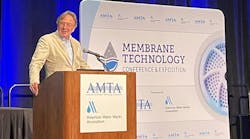The following is a transcript of the Nov. 28, 2011, edition of the WaterWorld Weekly Newscast.
Hi, I'm Angela Godwin, digital media editor for WaterWorld magazine, bringing you this week's water and wastewater news headlines. Coming up...
• Feds doubt hacker caused pump failure
• Wastewater plant solar project to save town $1.5 million
• Online water expo issues call for abstracts
• Fourteen cities profiled in green infrastructure report
• Poor pay more for water in Senegal
[story1]
The FBI and Department of Homeland Security are casting doubt on Illinois Statewide Terrorism and Intelligence Center claims that a Russian hacker caused a pump failure at a rural Illinois water utility.
In a report released earlier this month, STIC said the hacker was able to use stolen credentials to gain access to the water utility's SCADA system, turning a pump off and on until it finally burned out.
Utility employees at the Curran-Gardner Township Public Water District reportedly noticed minor glitches in the system in the two to three months leading up to the pump failure but did not suspect a security breach.
Now DHS and the FBI are saying that's because there wasn't one.
The agencies said that, based on "detailed analysis," there was no suspicious or unauthorized traffic from any outside entities.
An investigation into the pump failure is still ongoing.
[story2]
Prescott Valley, Arizona, broke ground on a new solar installation at its wastewater treatment plant and booster station that's expected to save the town more than $1.5 million over the next 15 years.
The town worked with solar development and finance company Smart Energy Capital, and Wilson Electric of Tempe, Arizona, who will build and maintain four units expected to generate 2.7 million kWh of solar power in the first year.
Because Prescott Valley was able to take advantage of incentives with Arizona Public Service, electricity generated by the system can be sold back at a fixed rate of 8.884 cents per kilowatt-hour for 25 years.
The project is scheduled for completion in March 2012.
[story3]
VirtualH2O, the completely online water industry conference and expo, has opened its call for abstracts for its February 21st event.
Organizers are seeking informative, non-commercial presentations on water and wastewater industry projects, technologies, and case histories.
There's no cost to participate and absolutely no travel required!
If you would like to share your expertise with industry peers, visit virtualh2oevent.com to submit your abstract by December 16.
[story4]
The Natural Resources Defense Council has followed up its 2006 report 'Rooftops to Rivers' with 'Rooftops to Rivers II,' which looks at how fourteen major metropolitan cities are using green infrastructure to clean waterways and save money.
The report details common water pollution problems and shows how some forward-thinking cities are using green infrastructure to address them.
The cities are ranked on a 6-point scale -- topping the list: Philadelphia, Pennsylvania. There, it's estimated that the city's state-approved green infrastructure plan will cost billions less than a traditional approach to managing sewage overflow problems. And it will "green" 34% of the city's impervious surfaces.
Other green infrastructure leaders include Milwaukee, WI, New York City, Portland, OR, and Washington, DC.
For the complete report, visit nrdc.org/rooftops.
[story5]
After a week-long mission in Senegal, UN special envoy Catarina de Albuquerque of Portugal is urging the west African nation to increase its investment in water and wastewater infrastructure.
Although the country has dramatically increased its water coverage in recent years, residents of Senegal's poor, crowded suburbs -- who don't have running water at home -- pay up to four times more for water than more affluent citizens, she said.
Forced to get water from street fountains, residents in these cramped communities are spending up to 20% of their monthly income on water, way above the international standard of about 3 to 7%.
For WaterWorld magazine, I'm Angela Godwin. Thanks for watching.
###


